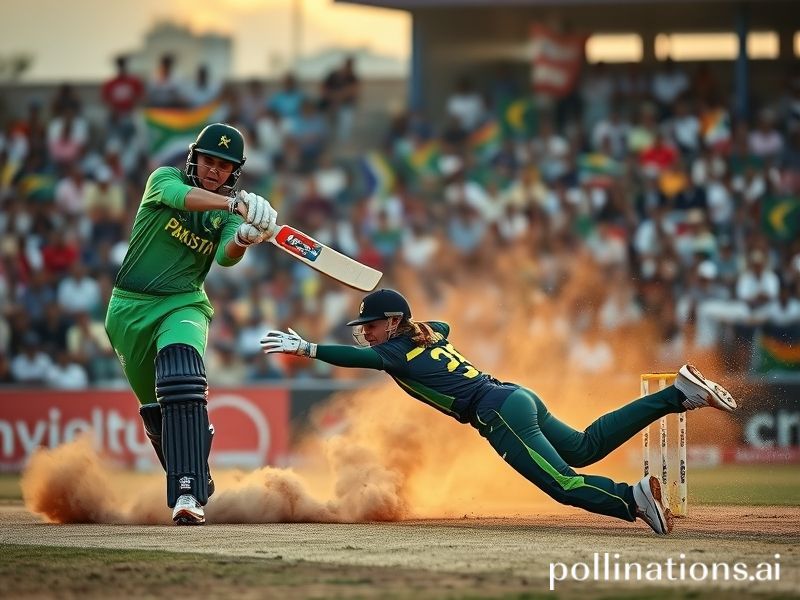When Karachi Night Fell: Pakistan vs South Africa Women and the Global Illusion of Progress
Karachi, Wednesday night. Somewhere between the smog and the ghost of British imperialism, two groups of women in matching pyjamas tried to hit a ball the size of a tangerine with a plank of willow. On paper, it was Pakistan Women versus South Africa Women, Match 3 of the ICC Women’s Championship. In the greater scheme of things, it was humanity’s latest attempt to convince itself that the planet is not, in fact, on fire.
Cricket, that most genteel of colonial souvenirs, has become the global north’s favourite guilt-free export: green fields, polite applause, and the illusion of a level playing field—provided you ignore the fact that most of the audience is still male, the broadcast rights are still hoarded by Rupert Murdoch’s extended family, and the players’ mothers are still asked when they plan to get a “real job.” But let us not allow reality to spoil the romance.
The fixture carried the usual geopolitical baggage. Pakistan arrived fresh from a T20 series in which they discovered, to everyone’s surprise except their own, that you cannot win matches if your top order treats dot balls like rare Pokémon. South Africa, meanwhile, landed with the swagger of a team that has read its own press clippings and therefore knew its pace attack could make the stumps perform interpretive dance. Both squads had spent the previous week navigating the same pandemic travel protocols that once grounded billionaires but somehow never delay arms fairs.
Still, the game began on schedule—an achievement roughly equivalent to holding a climate summit and actually banning coal. Pakistan batted first, posting 223 for 8, a total that sat halfway between competitive and “please clap politely.” Captain Nida Dar clubbed a defiant 57, proving that if you give a woman a bat and 30 years of institutional neglect, she can still clear mid-wicket. South Africa chased like a hedge fund pursuing tax efficiency: efficiently, soullessly, and with just enough flair to keep the advertisers happy. Laura Wolvaardt anchored with 82 not out, the innings as serene as a Swiss bank statement and twice as secure.
The margin was six wickets with 14 balls to spare, which sounds comfortable until you remember that both boards still pay their women in “exposure” and leftover airline miles. The result nudged South Africa up the Championship table—useful currency when begging for World Cup qualification and, by extension, a paycheck that doesn’t arrive via carrier pigeon. Pakistan, meanwhile, remain stranded in the lower-middle class of world cricket, that awkward space where moral victories are counted on an abacus and the bus still breaks down outside Lahore.
What does it all mean, beyond the obvious—that sport remains one of the few arenas where patriarchy has to sit in the stands and pretend to enjoy itself? For one, the match was streamed in 94 countries, proving conclusively that nothing unites humanity like unpaid overtime. Viewers from Stockholm to São Paulo tuned in, mostly because terrestrial television has been replaced by a subscription service that costs more than a monthly food budget in either Karachi or Cape Town. The global audience dutifully ignored the yawning gap in resources—South Africa’s domestic contracts recently doubled to slightly above minimum wage, while Pakistan’s players still share kits the way teenagers share Netflix passwords—because hope, like buffering, springs eternal.
More importantly, the fixture advanced the slow-motion revolution that is women’s sport: a movement that asks whether half the human race might be allowed to sweat in public without apologising. Each boundary was therefore a tiny act of sedition against every boardroom that still schedules meetings during school pick-up time. Each wicket, a rebuttal to the marketing executive who insists that “the women’s game doesn’t sell”—a phrase he utters between sips of a beverage whose entire ad campaign features Serena Williams.
When the last ball was bowled, the teams shook hands with the compulsory sincerity of award-show presenters. Fireworks crackled over the National Stadium, because nothing says sustainable progress like sulphur in the upper atmosphere. Fans filed out, selfie-sticks in hand, already meme-ing the dropped catch that will haunt some poor fielder’s Instagram for the rest of her natural life. And somewhere in the commentary box, an ex-player turned pundit declared the future “bright,” which is what we always say when the present refuses to pay invoices.
Cricket, bless its anachronistic heart, keeps pretending it’s just a game. The rest of us know better: it’s the world’s longest-running metaphor, and tonight the metaphor won by six wickets. Don’t forget to like and subscribe.







